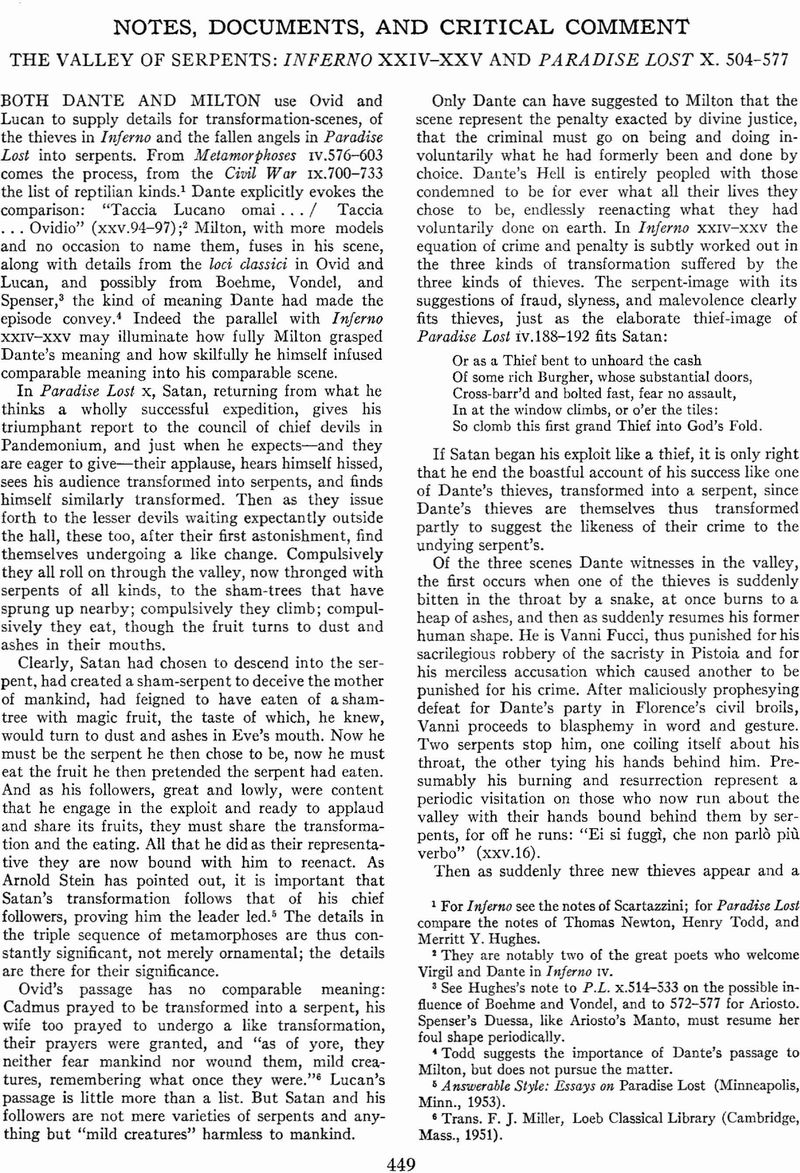No CrossRef data available.
Article contents
The Valley of Serpents: Inferno XXIV-XXV and Paradise Lost X. 504-577
Published online by Cambridge University Press: 02 December 2020
Abstract

- Type
- Notes, Documents, and Critical Comment
- Information
- Copyright
- Copyright © Modern Language Association of America, 1963
References
1 For Inferno see the notes of Scartazzini; for Paradise Lost compare the notes of Thomas Newton, Henry Todd, and Merritt Y. Hughes.
2 They are notably two of the great poets who welcome Virgil and Dante in Inferno iv.
3 See Hughes's note to P.L. x.514–533 on the possible influence of Boehme and Vondel, and to 572–577 for Ariosto. Spenser's Duessa, like Ariosto's Manto, must resume her foul shape periodically.
4 Todd suggests the importance of Dante's passage to Milton, but does not pursue the matter.
5 Answerable Style: Essays on Paradise Lost (Minneapolis, Minn., 1953).
6 Trans. F. J. Miller, Loeb Classical Library (Cambridge, Mass., 1951).
7 Cf. Chateaubriand, Génie du Christianisme (Lyons, 1809), ii, 262; Coleridge as quoted in E. H. Plumptre, trans, and éd., The Commedia and Canzoniere of Dante (London, 1866), ii, 441, and in Paget Toynbee, Dante in English Literature (London, 1909), i, 626; Macaulay, Milton and Machiavelli (London, 1868), p. 24; S. Humphreys Gurteen, The Epic of the Fall of Man (New York, 1896), pp. 366–367, 376–381; E. H. Pember, “On the Conception and Treatment of Satan in Paradise Lost and the Inferno,” 1908 Milton Memorial Lectures, ed. P. W. Ames (London, 1909), pp. 78–82; Alice Galimberti, Dante nel Pensiero Inglese (Florence, 1921), pp. 63, 71; Antero Meozzi, “Paralleli Danteschi,” Il Giornale Dantesco, xxvi (1923), 127; C. H. Herford, “Dante and Milton,” Bidletin of the John Rylands Library, viii (1924), 198, 218–220; E. E. Kellett, Reconsiderations (Cambridge, Eng., 1928), 143–146. For the stock comment in Lamenais and Lamartine see De Sanctis on Dante, ed. and trans. J. Rossi and A. Galpin (Madison. Wis., 1957), pp. 108, 148.


